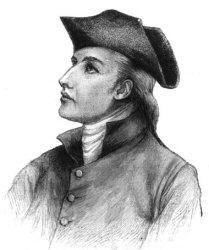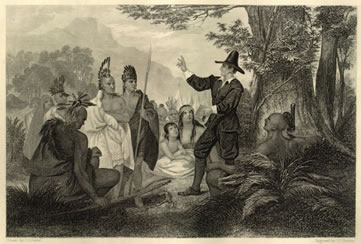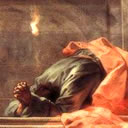David Brainerd - Part 2
 He was assigned to Stockbridge, Massachusetts, and arrived there on March 31st, 1743, and began his ministry the next day. He was stationed 20 miles west between Stockbridge and the Hudson River at a place called Kaunaumeek, 18 miles south east of Albany. Without conversation, or company, he was very lonely even though the Indians were cordial to him. On April 20th (his 25th birthday) he spent the day fasting alone in the woods in prayer. His diet was hasty-pudding, boiled corn, and bread baked in ashes. His lodging was a heap of straw, laid upon boards in a log room without any floor. He traveled one and one half miles each way daily, on foot, in order to see the Indians. A local Christian from Stockbridge became his interpreter and friend. Brainerd learned to pray with the Indians in their own language. They translated Psalms and hymns, and started an "English" school. By the first of August he had completed building his hut and had a better place to sleep. But other problems mounted. He had to go or send for bread and food that was ten or more miles and it would turn moldy and sour before he could eat all of it. But Brainerd did not complain. The presence and worldly conversation of some irreligious Dutchmen oppressed him more than all the difficulties of his wilderness life. He made four brief trips to New York during this time. During one of his visit he became seriously ill. Recovering sufficiently he returned to his station at Kaunaumeek.
He was assigned to Stockbridge, Massachusetts, and arrived there on March 31st, 1743, and began his ministry the next day. He was stationed 20 miles west between Stockbridge and the Hudson River at a place called Kaunaumeek, 18 miles south east of Albany. Without conversation, or company, he was very lonely even though the Indians were cordial to him. On April 20th (his 25th birthday) he spent the day fasting alone in the woods in prayer. His diet was hasty-pudding, boiled corn, and bread baked in ashes. His lodging was a heap of straw, laid upon boards in a log room without any floor. He traveled one and one half miles each way daily, on foot, in order to see the Indians. A local Christian from Stockbridge became his interpreter and friend. Brainerd learned to pray with the Indians in their own language. They translated Psalms and hymns, and started an "English" school. By the first of August he had completed building his hut and had a better place to sleep. But other problems mounted. He had to go or send for bread and food that was ten or more miles and it would turn moldy and sour before he could eat all of it. But Brainerd did not complain. The presence and worldly conversation of some irreligious Dutchmen oppressed him more than all the difficulties of his wilderness life. He made four brief trips to New York during this time. During one of his visit he became seriously ill. Recovering sufficiently he returned to his station at Kaunaumeek.
On the day after Christmas, he wrote, "I was very much fatigued with my journey, wherein I underwent great hardships; was very much exposed and very wet by falling into a river." Brainerd had principles that most didn't understand or want to be acquainted with. Many felt he was too intense about some things. At the ordination of a friend, Samuel Hopkins, he felt very depressed as he could not understand the lack of seriousness and reverence, or the excessive celebration and food. In January of 1744, he spent the middle of the winter alone in his little hut, yet they were happy hours. On Sunday March 11, he preached his last sermon at Kaunaumeek, as he was now seeking new tribes to win to Christ.
He again received a call to East Hampton, to be the pastor there. Suffering weakness and headache, he died inwardly to two attractive calls, writing, "Resolved to go on still with the Indian affair, if divine providence permits; although I had before felt some inclination to go to East Hampton." His other call to Millington was likewise turned down.
The commissioners instructed him to go to Pennsylvania. He again had a serious sick spell for three days, and went home to Haddam for the first time in 15 months. Now 26 years of age, he left home again. Spending some days at Salisbury, Connecticut, he left May 7th arriving on May 13th at present day Easton, Pennsylvania, within the forks of the Delaware River. Here he begin preaching to the Indian tribes once again.
Brainerd was well received by the Indians and usually taught them in the chief's house. Traveling some 70 miles back to New York, Brainerd was ordained on June 11, 1744, by the Presbytery of New York. On June 19th he left friends and benefactors to seek again God's chosen ones in the remote wilderness.
 By the end of the summer some 40 Indians were listening to his message. He was plagued with pain, and had difficulty controlling his legs after long hours on horseback. He also had to cope with Tattamy, his interpreter, who was totally unfamiliar with the white man's Bible. In July a flicker of heart interest by the Indians caused him to work hard preaching and translating. One time he was asking the Lord to take him home. Then he heard the Indians intended to have an idolatrous feast and dance. Desire to live surged back into him as he used his only weapon — prayer, and the Indians changed their plans.
By the end of the summer some 40 Indians were listening to his message. He was plagued with pain, and had difficulty controlling his legs after long hours on horseback. He also had to cope with Tattamy, his interpreter, who was totally unfamiliar with the white man's Bible. In July a flicker of heart interest by the Indians caused him to work hard preaching and translating. One time he was asking the Lord to take him home. Then he heard the Indians intended to have an idolatrous feast and dance. Desire to live surged back into him as he used his only weapon — prayer, and the Indians changed their plans.
During this time he lived much of the time with the Hunter family at a place known as Hunter's Settlement. Brainerd was the supply minister to the whites there, along with his ministry to the Indians. The rest of the summer he lay in "illness and uselessness." The first week of August he preached to the Indians twice, although "obligated to sit down the whole time." By September he was somewhat recovered and took a three week vacation. It was a journey of recuperation and pleasure, of visiting home and friends back in New England.
He now had a desire to go westward to reach the Indians on the Susquehanna River. Brainerd, an associate Eliab Bryam, Tattamy and two other Indians left on October 2. His horse fell down and broke her leg, so Brainerd continued to the nearest house 30 miles away on foot. The picture of the two young ministers alternately riding their one horse must have been intriguing. They were well received by the Indians, spent a few days there, and then returned the 70 miles where a new horse was given to Brainerd.
Resuming his life in the wilderness, he began to build a house for himself with the help of others. Moving into his new quarters he spent December 6 in prayer and fasting, "to implore the blessing of God on myself, on my poor people, on my friends, and on the church of God." Beginning at Christmas he went through a terrible month of despondency. Things brightened up on Sunday, February 17, 1745, when he preached to a group of white people coming from scattered frontier homes to have Communion. He greatly appreciated his friends, both white and Indian, and on March 7 he left them for a five week trip to New England. In March and April, he rode more than 600 miles searching New Jersey, New York and Connecticut to find a companion who would help and support him in his work. This goal was not realized, for none was, "qualified or disposed for this good work." So he returned alone to the Forks of the Delaware to continue his work. On April 20 (27th birthday) he was at the Abington Presbyterian Church, between Philadelphia and Neshaminy for a three-day ministry.
Weak in body, Brainerd and Tattamy left May 8th for their first major trip to the interior Indians along the Susquehanna River. They reached Shamokin, the headquarters for several tribes of Indians, stopped off at other settlements and returned home, the round trip taking 22 days. The 340 mile journey left Brainerd weak and dejected, depressed and disillusioned about the prospects among the Indians in that area. Except for Tattamy and his wife, who both were growing spiritually, he was in anguish of heart worried that the past year was a failure.
He then heard about a group of Indians at a place called Crossweeksung (9 miles southeast of Trenton) in New Jersey, about 80 miles southeast of the Forks of Delaware. He arrived June 19, 1745. He spent two weeks there with a good deal of conviction, tears and interest amongst the Indians. Upon his return to the Forks, these Indians also seemed to be much more responsive to his ministry. On July 21 he baptized Tattamy and his wife, his first converts among the Indians. He went back to Crossweeksung and experienced the most glorious week in his life. On August 8 the power of God came down on his little group of 65 as he preached. The sudden and unexpected gripping of the Indians was followed by earnest prayers. Many genuine conversions took place. News traveled, and soon other Indians were coming to hear the young white preacher. Members of the careless white community began to show up also, and get converted. On August 25, he baptized 25 of the Indians now the years of prayer and suffering were beginning to bear some fruit.
He decided to make one last effort to evangelize the Indians along the Susquehanna River and spent the month of September attempting this, but with no apparent success. Back at Crossweeksung on October 5, he was overjoyed at the difference to the response of the Gospel. Others were saved and baptized. Christmas had a new meaning to both preacher and hearer, and after two years of barrenness Brainerd rejoiced greatly as he reaped some spiritual fruit.
On January 31, 1746 another milestone was reached — Brainerd engaged a schoolmaster for the Indians and a dozen primers were passed out. In February he visited his "parish" back at the Forks being "under great weakness and some pain." Some evangelists (Indian converts) from Crossweeksung went with him. There were now about 150 who followed him and his directions. On April 20 (28th birthday) he preached the Easter story from Luke 24 to the Indians. On April 27th another milestone was reached — the Indians took the Lord's Supper. He settled down at Cranberry on May 3rd, and a place of worship was established known as Bethel. He was tempted to stay here. But his heart was back in the Susquehanna River area where he had already failed three times to make any headway with the pagan Indians.
Finally on August 12, he left his friends at Cranberry and with six Indian evangelists attempted his fourth trip to the Susquehanna River area. He had never gone further west than Shamokin before, but now he desired to go an additional 100 miles to a site near present day Lockhaven, Pennsylvania. He recorded such things as "...sweat much in the night, so that my linen was almost wringing wet all night, was exceedingly weak, so that I could scarcely ride; it seemed sometimes as if I must fall off from my horse, and lie in the open woods..."
This trip finally broke his health completely, and he had to curtail much of it. Many might ask, "why did he go on this journey despite his great weakness and ill health?" He simply could not confine himself to one spot, when so many men were dying without Christ everywhere. Back at Shamokin on September 6, he clung to his life, "coughing and spitting blood." On September 20 he arrived back at Cranberry. Brainerd now realized that the tuberculosis of his lungs was going to destroy his body. He felt somewhat guilty in that he had recklessly injured his health and aggravated his illness. But in reality, his zeal and outdoor life probably prolonged his days, since his problem had started several years prior while at Yale. On October 6, he had his last blessed day at Cranberry, having the Lord's Supper with 40 of his converts and baptizing two adults. His final harvest was now 85 Indians. November 3 was his last day as pastor of his flock in Cranberry. He spent the long winter in Elizabethtown, New Jersey with Jonathan Dickinson. Rallying in health he made one last visit to his Indian converts on March 18-20, 1747, and bid them goodbye for the last time. On April 20 (29th birthday) he spent the day mostly in bed at the Dickinsons. He left for New England the next day, not realizing that his 59 year old host would pass on two days before Brainerd. Brainerd was invited to Jonathan Edwards' house, by probably both the preacher and his 17 year old daughter, Jerusha, whom Brainerd had greatly admired even as a young teenage girl. He visited his kin-folk at Haddam, (May 1) bidding farewell to his favorite sister, Jerusha Spencer, little realizing that he would get news of her death in two more months. Arriving at the Edwards' home on May 28, he was vastly better and cheerful. David's petition in family prayer was usually "that we might not outlive our usefulness." Jerusha was his nurse for 19 weeks,devoting herself with great delight because she looked on him as an eminent servant of Jesus Christ. He wrote letters signing them, "your dying brother". He took his last horseback ride and prayed with the family for the last time on August 11th. A room on the first floor was set aside for him the following week as he could not climb steps. He went to church for the last time September 2nd. Edwards described his last days — swollen feet — constant pain — discharge of purulent matter — broken whispers — agonies of body. His last Sunday, October 4th, he recorded this touching conversation with Jerusha, in appreciation of her constant companionship and love.
"Dear Jerusha...though, if I thought I should not see you, and be happy with you in another world, I could not bear to part with you. But we shall spend a happy eternity together."
On Wednesday he discussed his Indian work with his brother John, who succeeded him at Bethel, and on Friday, October 9, it was all over. His last words were "He will come, and will not tarry. I shall soon be in glory; soon be with God and His angels." He was buried on Monday with Jonathan Edwards conducting the funeral. Four months later, grieving Jerusha, in her 18th year, took sick and in five days died on February 14, 1748, joining David in heaven and was buried next to him.
John Wesley said, "Let every preacher read carefully over the life of David Brainerd," and distributed his life story to all his societies. F. W. Robertson, Ion Keith Falconer, Robert Murray McCheyne, A. J. Gordon, Francis Asbury, Jim Elliott, Thomas Coke, William Carey and Henry Martyn all were motivated to service through Brainerd, amongst others.
 There is a voice of Truth which can be heard crying out! Whether lost or saved, we believe you will meet the living Christ through this ministry.
There is a voice of Truth which can be heard crying out! Whether lost or saved, we believe you will meet the living Christ through this ministry.